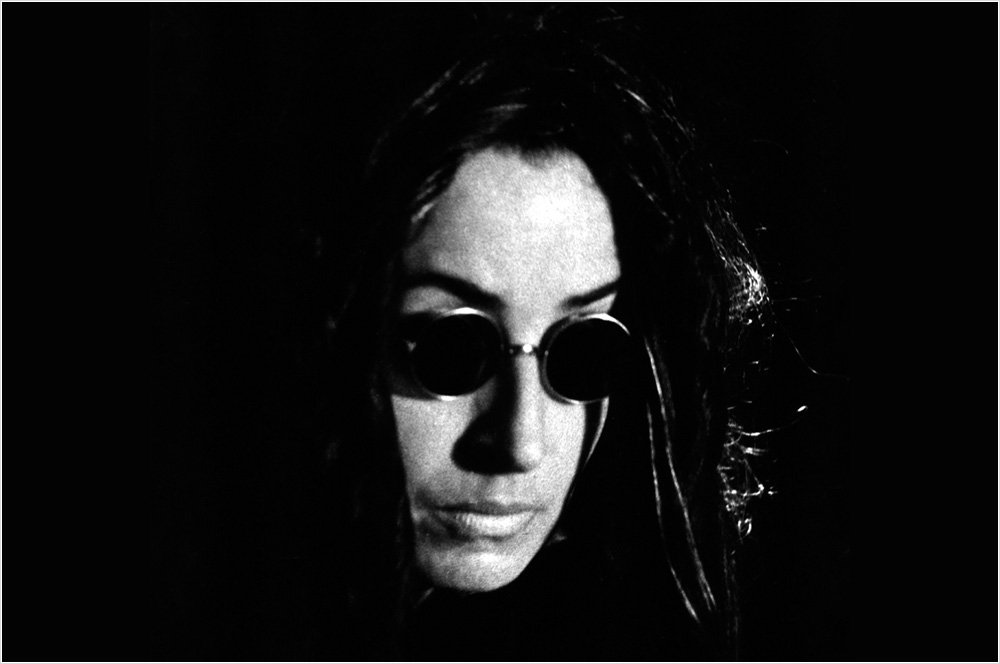
Irena Jun in Moonlight Sonata
Monodram is a radio opera by Bogusław Schaeffer realized electroacoustically in 1968 in the Experimental Studio of Polish Radio by Bohdan Mazurek in cooperation with the composer. The pre premiere of the monodram concert (played publicly from the tape) took place at the Krzysztofory Gallery in Krakow on October 7, 1968. The song was played for the first time on Polish Radio in the Horizons of Music broadcast, edited by Anna Skrzyńska.
The prototype of the composition was a performance for one actor, the Moon Sonata, which was directed by Józef Szajna with the participation of Irena Jun and with Schaeffer's music. The literary canvas is composed of the texts of contemporary Greek poets, Iannis Ritsos’ “Stare domy” and the Nobel Prize winner Jorgos Seferis’ “Drozd”. Irena Jun has been honored with awards and distinctions for her role at the Wrocław Meetings of One Actor Theaters, as well as at the Kontrapunkt Festival of Small Theater Forms.
The Moon Sonata, whose musical development became Monodram, is the oldest of the collaborations Szajna / Schaeffer. Later, the next ones included: Goethe's Faust, Majakowski's “The Bathhouse” , Bryll's “A November Matter”, O'Casey's “Purple Dust” and the original performances of Szajna: Replica, Replica IV, Witkacy, Gulgutier co-authored by Maria Czanerle, significant performances of Polish theater at the turn of the 1960s and 1970s century. In particular, music for the famous Replica (in theatrical and television version) was considered by many critics to be an integral and artistically equivalent part of this outstanding performance.
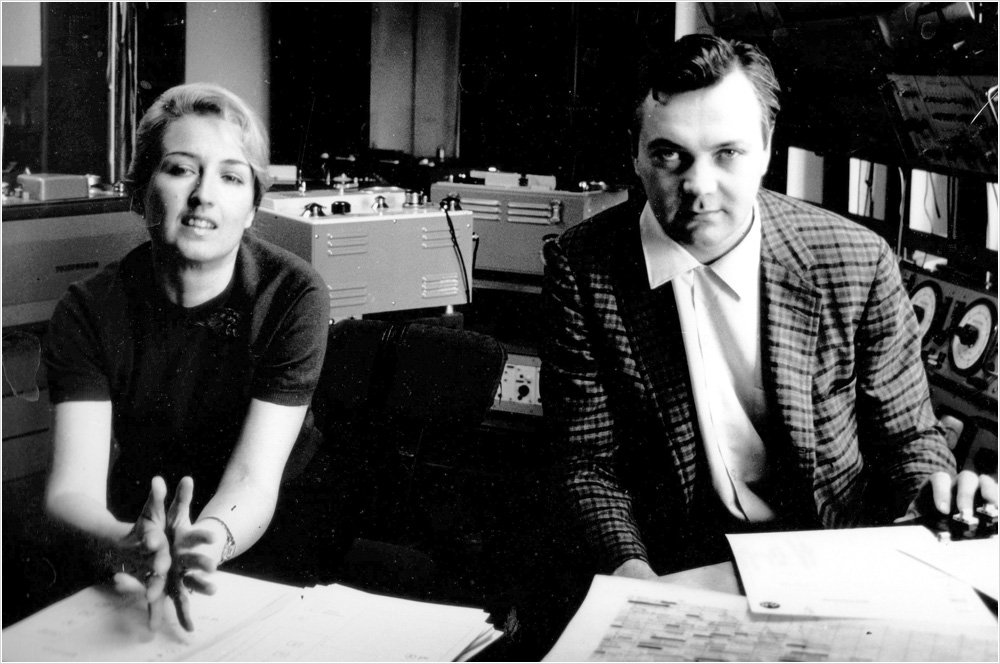
Anna Skrzyńska, Bohdan Mazurek
Apart from Szajna, the friends of Bogusław Schaeffer from that period included Jonasz Stern, Zygmunt Wachowicz, Adam Marczyński and the whole group of artists who gathered at the premises of the Krakow Association of Artists at ul. Łobzowska, where in the mid-1950s the Cricot 2 theater staged its first performances. Interest in the theater resulted in the creation of music for the performances of other theater directors: Jerzy Jarocki, Bohdan Cybulski. From the beginning of the sixties, the composer collaborated with visual artists, mainly with Tadeusz Kantor and Kazimierz Mikulski. In 1964 he joined the Krakow Group, and then was its vice president for several years. In this environment Schaeffer, in parallel to Tadeusz Kantor's artistic and theatrical activities, composed and performed his works, including the first non-stop happening for piano in Poland from 1960 (with the participation of Kantor), and earlier, in 1955, he wrote his first drama Webern.
A number of artists took up the form of radio opera in Poland, including Grażyna Bacewicz, Bernadetta Matuszczak, Tadeusz Szeligowski, Witold Rudziński, Tadeusz Paciorkiewicz, Zbigniew Wiszniewski, Zbigniew Penherski and Tomasz Sikorski, as well as Schaeffer. Also Krzysztof Penderecki's oeuvre is this kind of work, but the composer himself did not consider his “Death Brigade” (1963) as a successful attempt and for decades he deleted it from the catalog of his works. It was only in the current century that he decided to re-present an extremely original, striking song.
The radio opera, oscillating between a literary play and electroacoustic composition, created new, unusual possibilities of expression. Sounds and entire instrumental phrases, as well as various "sound objects", could be freely shaped - thanks to studio treatments, similarly vocal parts and actors’ lines. Entering the world of radio theater, the composer was confronted with an otherwise inaccessible opportunity to master the phonic universe, he could afford his own dramatic rehearsals, not to mention the attractive, tempting possibilities of this new texture. Actually unlimited executive apparatus, multi-track technique, multi-layer assembly and microphone directing, and the ability to present a powerful vocal-instrumental composition without involving astronomical finances and without organizing rehearsals - all this was offered by the radio theater of creative imagination.
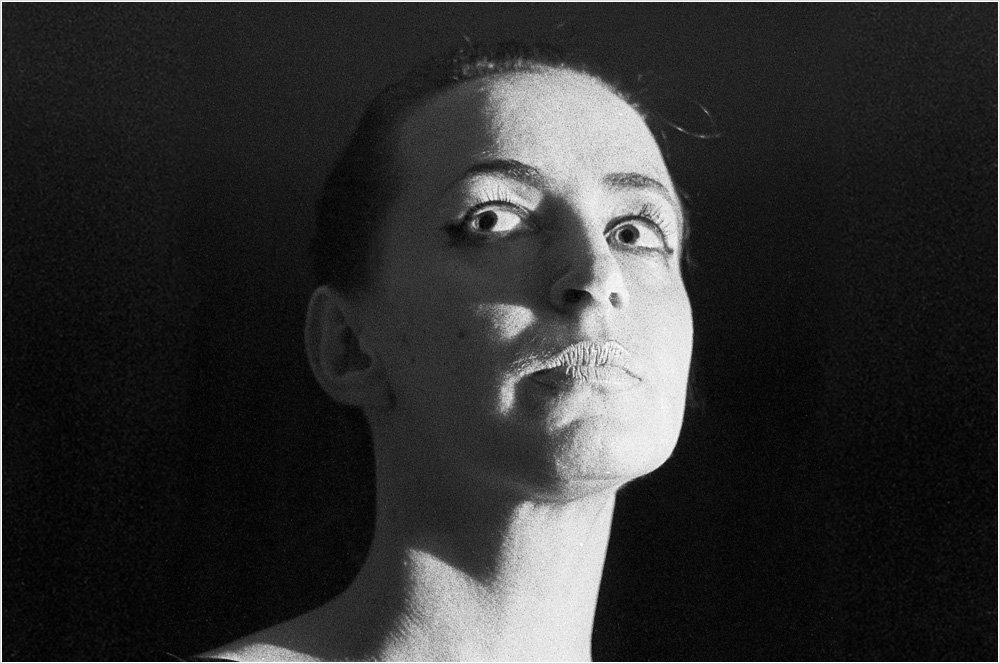
The distinguishing feature of radio operas from traditionally formed radio plays was the naturally dominant function of music, subordination to its literary layer and actor interpretation. The narrative of the works (e.g. in Schaeffer's Monodrama or The Adventures of Tomasz Sikorski’s Sindbad the Sailor, with the creation of Gustaw Holoubek) seems to be infinitely slow, stretched in time, immersed in an ocean of difficult to identify, oneiric sounds, corresponding to the aura of poetic suggestiveness of an epic monologue. All this, however, while maintaining the dramatic carrying capacity and legibility of the literary message.
Irena Jun created an outstanding acting creation in Monodrama - along with the composer they have adapted and arranged poetic texts. Jan Koecher undertook the directing cooperation in this project. The vocal material written by Schaeffer was performed by Izabela Jasińska, the specially composed parts were recorded by the Grand Theater String Quartet. The composer himself created and recorded the material on prepared piano and "sound objects". He also used recordings from the period of work on the Trio for flute, viola and harp and tape from 1967. One should also mention the percussion material used here, recorded by Michael Ranta for the request of the Polish Radio Experimental Studio.
The manuscripts of instrumental parts and vocal material were executed by the composer extremely carefully, using a two-color readable and convenient notation for musicians. Sheet music is an exciting challenge for performers. For sketching, modeling, scores, Schaeffer used graph paper, and used the machine to create the form structure on which he applied handwritten notes. After working on the work, there was finally a huge, hand-calligraphic, short "map" measuring more than a square meter - a schematic music score diagram, on a sheet of chalk paper.
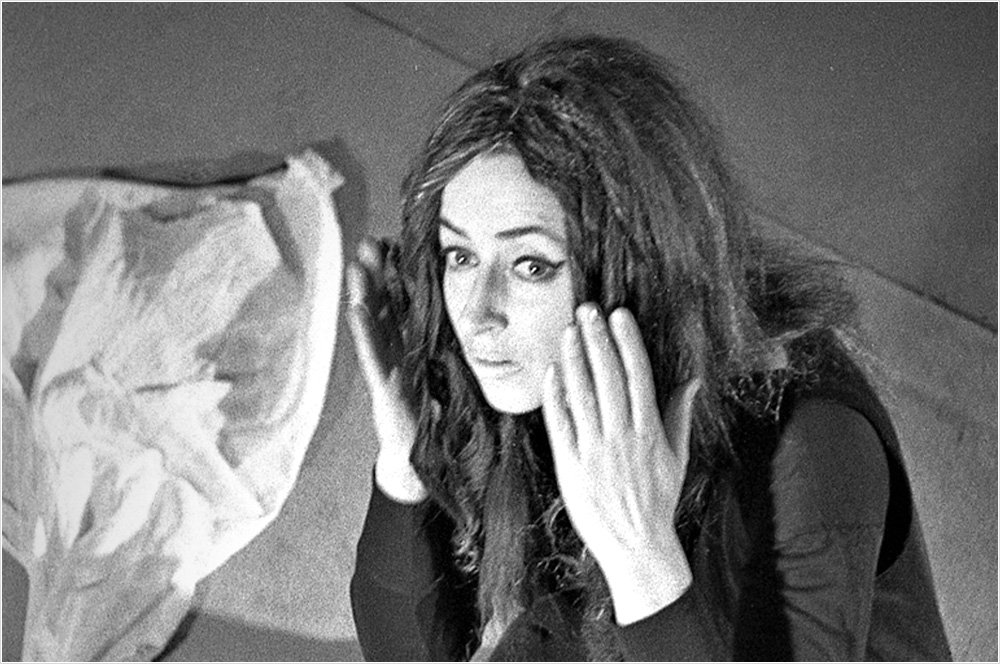
The realization of the Monodrama was undertaken by Bohdan Mazurek, who two years earlier was the performer of the legendary Schaeffer electronic symphony. The author dedicated it to the founder and head of the Experimental Studio, Józef Patkowski.
It should be emphasized that one of Patkowski's ambitions was the Studio's role as not only a technological but also an aesthetic base, a certain material (sound) base for the experimental music created here. This was one of the factors determining the individual, specific nature of the production of the Warsaw Studio. Were it not for his existence, Polish Radio would not have many great soloists who left their mark in the form of recordings of the output materials for electroacoustic works, or became solo performers of these. Not only soloists participated in the production of the Studio's catalog of sounds. For example, several hours of unusual material, designed and commissioned by Eugeniusz Rudnik, was recorded in the 1980s by the Polish Radio "Amadeus" Chamber Orchestra , managed by Agnieszka Duczmal.
The music created in the Experimental Studio of Polish Radio by Bogusław Schaeffer I described extensively in the book Studio Eksperyment. A collection of texts. Lexicon, published by the Bęc Zmiana Foundation. I also talked about it during a scientific session at the Krakow Academy of Music, and this lecture was published in the book Bogusław Schaeffer. Music possibilities. Outside Warsaw, Schaeffer also composed electronic and electroacoustic music, as well as computer music in other centers, including in Berlin, Stockholm and Zagreb. The richness of content and formal content of this work will certainly be the subject of fascination and research of subsequent generations.
Bogusław Schaeffer, using the method of heterogeneous collage in his Monodrama, created a work characterized by great artistry, expressiveness, shocking in its expression. The actress's creation is the main, but one of many, components of this ocean of waves rippling for over an hour. Suggestiveness of texts wrapped in dense sound tissue, captivates the listener with an intimate atmosphere, seems to impose an identification with the heroine's partner, existing perhaps only in her imagination.
Let us pause for a moment about the phenomenon of the role of Irena Jun, who met Józef Szajna on her way back in 1963 and then appeared in a series of his performances.
In the career of the actress, the Moon Sonata was - before the productions of Beckett's works, which she became famous for - the first one-actor performance. Starting playing in the Sonata ... half a century ago, Jun was a young actress. As she says some artistic perversion, the need to face a professional challenge, then told her to play the figure of an old woman. After years, she surprisingly returned to that performance. She appeared with it, among others during the "Solo" Festival in Olsztyn in 2014. She claims that today the Moonlight Sonata, and therefore also Monodram, returns to her with extraordinary strength, to her emotional and acting memory. Now, when her own, natural maturity has approached her heroine, the creation is gaining a new, fascinating dimension. In the fragments of Schaeffer's compositions played during the stage presentation, the loudspeakers come from the voice of young Irena Jun, who is already live, directly from the stage adding and duplicating her lines. The effect is moving, simply ineffable.
The artist remembers perfectly the first meeting with Józef Szajna regarding the staging of the Moonlight Sonata. It took place in the cafe of the culture center. The director asked her to bring a large sheet of white tulle. During the conversation, in a spacious fabric, he burned dozens of holes with a cigarette. In the back room empty at this time, there were plenty of coffee glasses. Szajna brought them and encrusted the holes with grounds dug out from their bottoms. This fabric was then used by the actress as the only stage design for the performance, and it has survived to this day and is again accompanying its presentations.
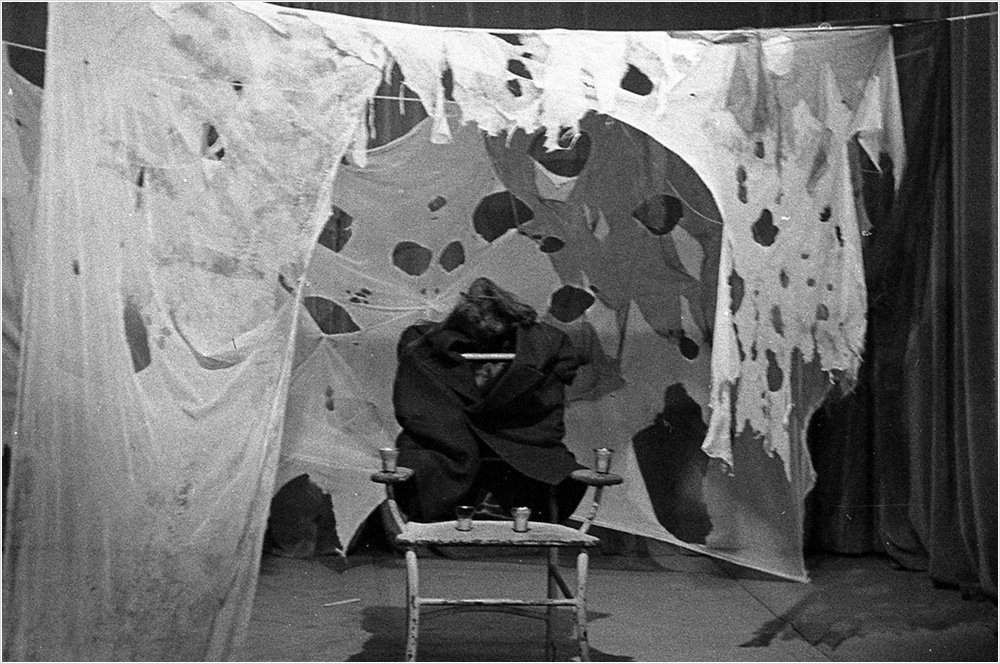
Józef Szajna - stage design for the Moonlight Sonata. Courtesy of Studio Theater Archive
And here is how the artist responds, asked about the perception of passing (Portal Biznes i styl, 30.10.2016, I don't have to run faster and faster in the "marathon of life". Aneta Gieroń talks to Irena Jun):
I.J. >> Life allows you to find yourself still further, and further, further, further ... and this "distance" is approaching. At the same time, this "distance" gives a sense of perspective. And despite everything, there is something good about staying on the road, not having to run faster and faster in the "marathon of life". When a person is alone, really alone, it is poignant that you can find your footprints in this loneliness. These traces allow you to believe that what happened in life, not necessarily artistic, but life in general - perception of the world, contacts with people - has its sense. This is a very specific condition - an attempt to find these traces or lack of them. And the thought of what has not been done and what will not be done anymore is the biggest ailment of passing.
A.G. - How much does young Irena from the Moon Sonata, more than 50 years ago, differ from the present Irena Jun?
I.J. - This is a huge change, which I already mentioned in the book of Remigiusz Grzela “What is most important”. The perversity of the fact that, as young, I tried to be both old and young, as if I were trying to imagine old age, it was fantastic. When I really got old, I can play as it was written.
A.G. - Continuing that dialogue. And now you can imagine yourself young.
I.J.– Being old, playing yourself young, playing yourself old, that's it! <<

Schaeffer's monodrama remains to this day one of the most original Polish contemporary compositions. In this publication, it is accompanied by two extraordinary complementary items. A tape with an extremely intriguing variation on the subject of radio-opera, a kind of post scriptum - namely, According to Monodrama - a sound material originally intended for television adaptation of a spectacle that did not occur, has been preserved in the composer's archive. The sizable composition brings a reflective sound landscape, immersed in a mysterious aura, in which the actress's voice appears in only a few lines. This treasure, like the Beckett’s Krapp tape, is not the end of the metaphysical discoveries that accompany Monodaram. The next "flake" of the main work is Monodram-Prologue. It takes place in a wider, changed sound space, resembles a barely tangible shell, a shiny layer, a sound shroud removed from a finished work. All these three compositions, which can be treated both as variants and autonomous creative proposals, using similar material, complement each other, showing a phantasmagoric world created in the studio.
The supplement is two Schaeffer's theatrical musical illustrations: Troilus and Kresyda for the staging of William Shakespeare's play directed by Piotr Paradowski, presented at the Wybrzeże Theater in Gdańsk in 1965, and Scarlet Dust to the play of Sean O'Casey directed by Józef Szajna staged at the St. Wyspiański Silesian Theater in Katowice in 1968.
Both sound projects were also made in the Experimental Studio of Polish Radio in cooperation with Bohdan Mazurek. In Troilus, we can listen to the piano player Bogusław Schaeffer himself. It is impossible to determine who played the saxophone and string instruments. And the violin material for Purple Dust was also recorded by the composer himself.
Bolesław Błaszczyk
Tracklist
cd 1 Monodram

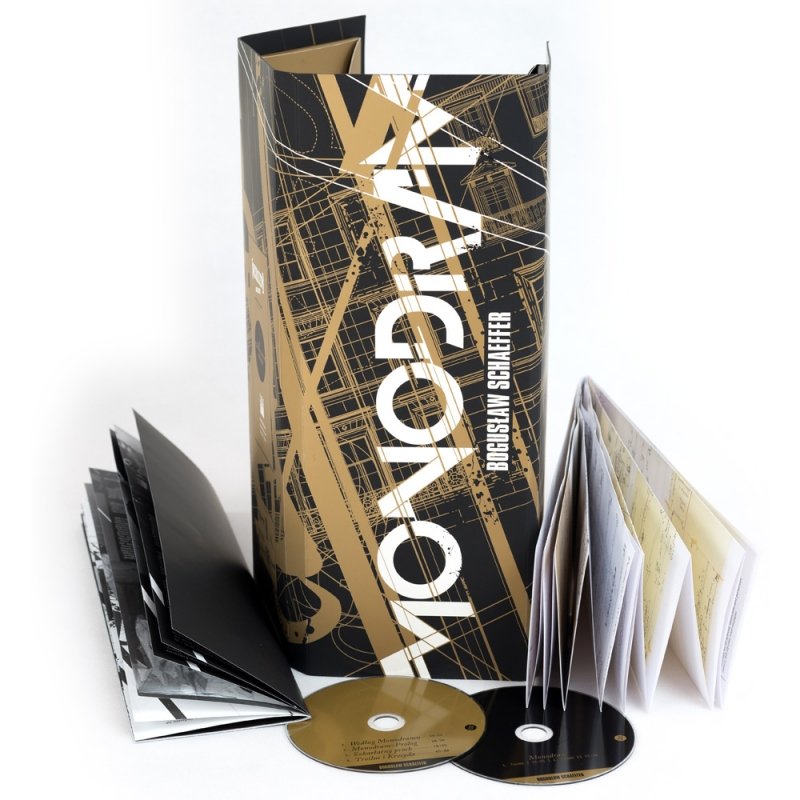




 Józef Szajna - stage design for the Moonlight Sonata. Courtesy of Studio Theater Archive
Józef Szajna - stage design for the Moonlight Sonata. Courtesy of Studio Theater Archive 